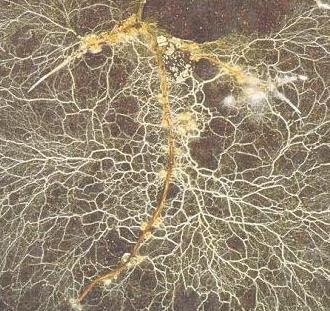Want to Reduce Soil Erosion and Improve Water Quality? Employ Fun Guys (Fungi)!
Arbuscular mycorrhizal fungi (AMF) develop a dense hyphal network of fungal mycelium which creates a three-dimensional matrix that enmeshes and crosslinks soil particles without compacting soil. This hyphal network not only promotes plant growth and root system development, it also protects soil from erosion by wind and water. The benefits of AMF are particularly critical for plants in dry sandy soils in arid regions. The collective effects of AMF on soil qualities also result in a higher water retention capacity, which directly reduce nutrient and contaminant leaching from the soil. In particular, highly mobile phosphorus and nitrates are effectively sequestered, thus reducing contamination of receiving surface and groundwater. So which fungi do we invite to the party?
The ability to form AMF in soils having low temperatures may be related to adaptation of some fungi to the prevailing climatic conditions where they originated. For optimal AMF colonization, soil temperatures should exceed 50o F, since the ability of AMF spores and other propagules to colonize roots can be slowed or halted at low soil temperatures (<45oF). The Ericoid endomycorrhizal group of fungi (Arbutoid and Monotropoid) exist in extremely harsh conditions and provide the host plant with carbon sources (Moore, 2019). Once colonization is complete the AMF can survive throughout the winter within the root tissue of perennial host plants.
Not all fungi are created equal. Tarbell and Koske (2007) tested eight commercial inocula of AMF in a sand/peat medium. Only three of the inocula formed mycorrhizas when used at the recommended rate, and the extent of colonization ranged from 0.4 to 8.0%. Increasing the amount of inoculum (10x) resulted in colonization levels of 8.6 to 72.5%. These findings suggest that preliminary trails be conducted prior to making significant investments in commercial AMF inocula.

